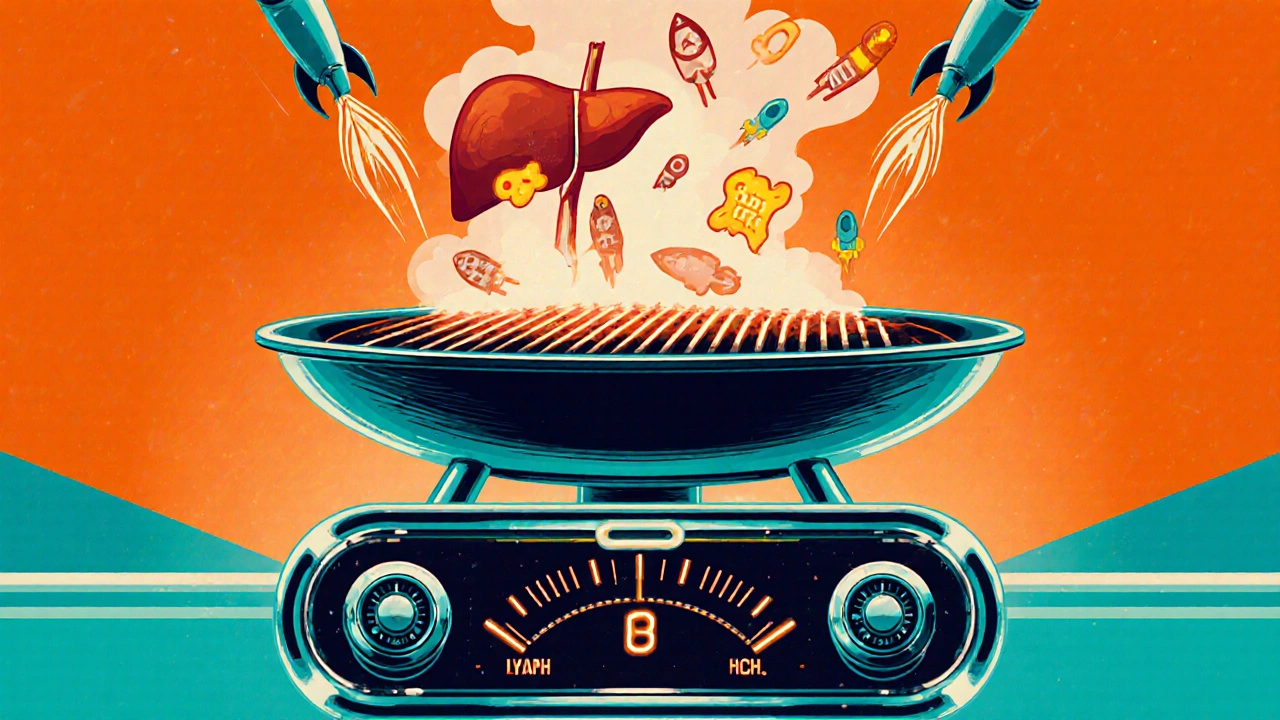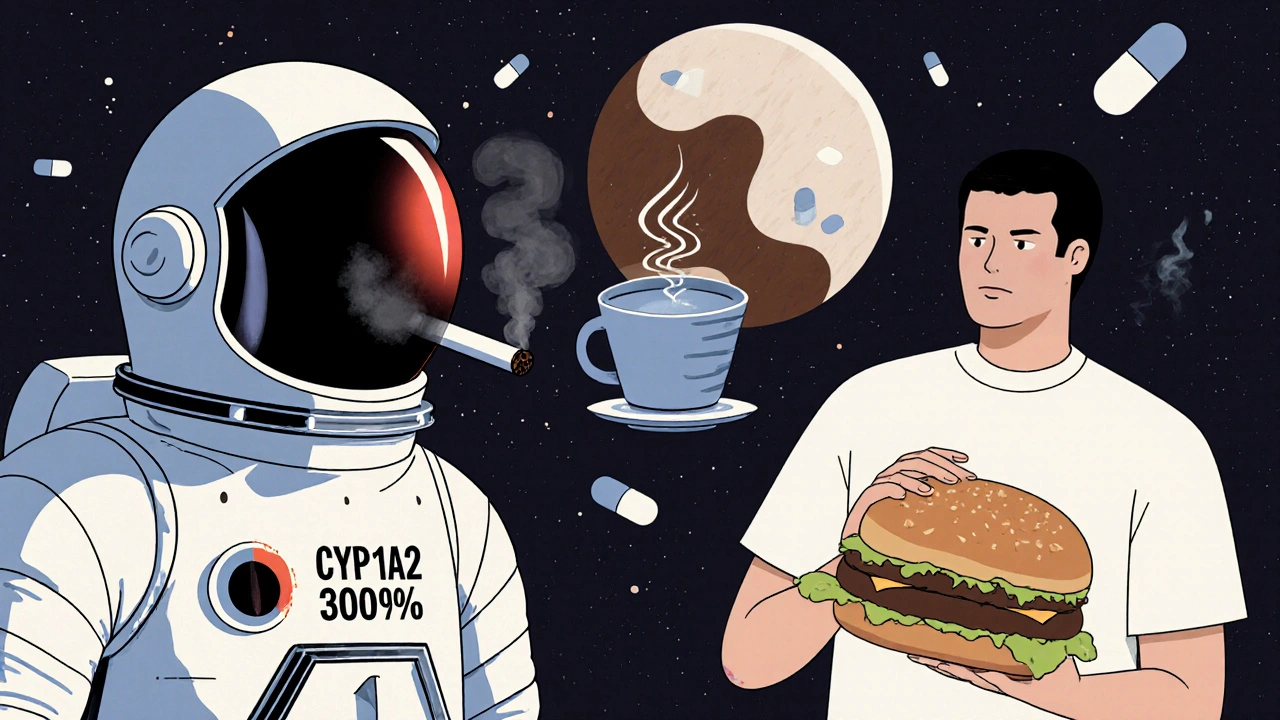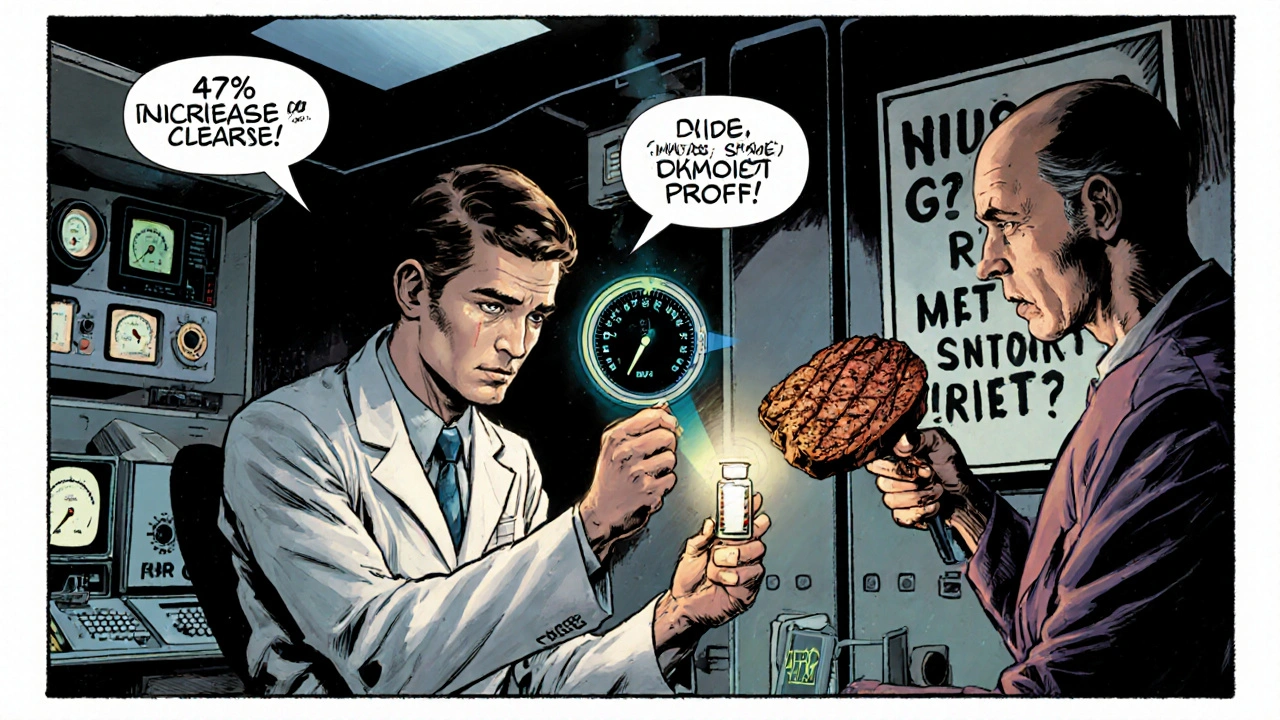Charcoal-Grilled Meats and Medications: What You Need to Know About CYP1A2 Induction
 Nov, 21 2025
Nov, 21 2025
Ever wondered if your weekend barbecue could mess with your meds? It sounds far-fetched - steak, burgers, chicken on the grill - how could that affect your prescription? But there’s real science behind it. The high heat of charcoal grilling creates chemicals that can turn on a key enzyme in your liver called CYP1A2. This enzyme handles about 10% of the drugs you take, including clozapine for schizophrenia, theophylline for asthma, and even caffeine. The question isn’t whether it happens - it’s whether it matters for you.
What Exactly Is CYP1A2?
CYP1A2 is one of your body’s main drug-processing tools. Think of it like a factory worker in your liver that breaks down certain medications so they can be cleared from your system. If this worker gets overworked or starts working faster, your drug levels can drop too low - meaning your medicine stops working. If it slows down, you might build up too much of the drug and risk side effects.
Some drugs are especially sensitive to changes in CYP1A2. Clozapine, for example, has a very narrow window between helping and harming. Too little, and your psychosis returns. Too much, and you could get seizures, heart problems, or even death. The same goes for theophylline - used for COPD and asthma. A small change in how fast your body clears it can mean the difference between breathing easy and ending up in the ER.
How Does Charcoal-Grilled Meat Affect CYP1A2?
When meat hits high heat - especially over open flames or hot coals - it produces chemicals called polycyclic aromatic hydrocarbons (PAHs) and heterocyclic amines (HCAs). These are the same compounds linked to cancer risk. But they also bind to a receptor in your cells called AhR. That’s the trigger. Once AhR activates, it tells your liver to make more CYP1A2 enzyme. More enzyme means faster drug breakdown.
One landmark 1999 study from the University of Michigan found that people who ate about 250 grams of charcoal-grilled meat every day for a week had a 47% increase in liver CYP1A2 activity. That’s not small. The researchers took biopsies - actual tissue samples - and saw clear spikes in enzyme levels. They also found a direct link between the amount of PAHs in the meat and how much the enzyme increased.
But here’s where it gets confusing.
The Contradictory Study
Just six years later, another team in Denmark did a similar experiment. They had 24 healthy men eat charcoal-broiled meat twice a day for five days. Instead of taking tissue samples, they used caffeine as a probe - measuring how fast the body cleared it from urine. If CYP1A2 was induced, caffeine clearance should speed up. It didn’t. The change was just 4.2%, and it wasn’t statistically significant. They also tested other drugs like tacrine and proguanil. Nothing changed.
Why the difference? The Michigan study measured enzyme levels directly. The Danish study measured how the body actually used the drugs. One looked at the machine. The other looked at the output. The Danish team also used only men, shorter exposure, and didn’t control how charred the meat was. They questioned whether five days was long enough for full induction.
Neither study looked at real patients on real meds. So we don’t know if this enzyme change actually leads to treatment failure or toxicity in the real world.

What Do Experts Really Think?
The lead author of the 1999 study, Dr. Robert Fontana, still believes this interaction matters - especially for narrow-therapeutic-index drugs. He says the science is solid, and the body clearly responds to dietary PAHs.
But Dr. Kim Brøsen, who led the 2005 study, disagrees. He argues that the effect is too weak and inconsistent to be clinically useful. He calls it a lab curiosity, not a real-world problem.
The Clinical Pharmacogenetics Implementation Consortium (CPIC), which sets guidelines for how genes affect drug dosing, reviewed the evidence in 2017 and said: ‘There’s limited evidence that diet affects CYP1A2.’ They didn’t even list grilled meat as a concern.
And then there’s smoking. Cigarette smoke increases CYP1A2 by 200-400%. That’s five to ten times stronger than what grilled meat might do. If you smoke, your enzyme activity is already maxed out. Eating a burger won’t change much. But if you’re a non-smoker who rarely eats grilled meat and suddenly starts having it every day? Maybe.
What About Real Patients?
Ask pharmacists. Most say they’ve never seen a case where grilled meat caused a drug interaction. A 2022 survey found only 7% of community pharmacists even ask patients about grilled meat when dispensing CYP1A2 drugs. Compare that to grapefruit juice - nearly everyone asks about that. Why? Because grapefruit can cause dangerous, documented interactions. Grilled meat? Not so much.
There are only three anecdotal reports in the last ten years that even suggest a possible link. None proved causation. One patient on clozapine worried about backyard barbecues. Her pharmacist checked the literature and told her: ‘No documented cases in 20 years.’
Mayo Clinic and Cleveland Clinic - two of the most trusted health sources - don’t mention grilled meat in their medication interaction guides. But they both warn loudly about smoking and CYP1A2. That tells you where the real risk lies.

What Should You Do?
If you take a CYP1A2 substrate drug - clozapine, theophylline, tizanidine, olanzapine, or caffeine-based meds - here’s what you need to know:
- You don’t need to stop grilling. Occasional BBQ is fine.
- Don’t panic if you had a big cookout. One meal won’t change anything.
- But if you start eating grilled meat daily - especially if you’re a non-smoker - talk to your doctor or pharmacist.
- Watch for signs your medication isn’t working: worsening symptoms, new side effects, or sudden changes in how you feel.
- Don’t change your dose without talking to your provider.
The biggest risk isn’t the meat. It’s assuming nothing’s happening. If you’re on clozapine and suddenly start grilling every day, your doctor should know. They might want to check your blood levels before and after a big change in diet.
The Bigger Picture
This isn’t just about meat. It’s about how we think about food and drugs. We know alcohol, grapefruit, and smoking matter. But we overlook other things - like diet, cooking methods, even sleep patterns - because the science is messy.
The truth? For most people, grilled meat won’t affect their meds. But for a small group - non-smokers on critical drugs who suddenly change their diet - it might. And that’s enough reason to pay attention.
Right now, regulators like the FDA and EMA don’t require warnings on drug labels about grilled meat. That’s because the evidence isn’t strong enough. But science evolves. If future studies show genetic differences make some people more sensitive to PAHs - and they do - we might start seeing personalized advice: ‘If you have this gene variant, limit charred meat.’
Until then, keep grilling. Just stay aware. And if you’re on a drug that could be affected, don’t ignore the conversation. Your doctor might not bring it up - but you can.
Does charcoal-grilled meat really affect how my medication works?
It can - but only in rare cases. Studies show charcoal-grilled meat can increase CYP1A2 enzyme activity, which may speed up how your body clears certain drugs. However, most people won’t see any real change unless they eat grilled meat daily and are on a narrow-therapeutic-index drug like clozapine or theophylline. For the average person, occasional BBQ won’t make a difference.
Which medications are affected by CYP1A2 induction?
Medications metabolized by CYP1A2 include clozapine, theophylline, tizanidine, olanzapine, ramelteon, duloxetine, and caffeine. Drugs with a narrow therapeutic index - where small changes in blood levels can cause harm - are the biggest concern. If you’re on any of these and you’ve recently started eating grilled meat daily, talk to your provider about monitoring your levels.
Is smoking a bigger risk than grilled meat for CYP1A2?
Yes, by a large margin. Smoking increases CYP1A2 activity by 200-400%. Charcoal-grilled meat, at most, increases it by 50% - and only in some people. If you smoke, your enzyme levels are already elevated. Adding grilled meat won’t change much. But if you don’t smoke and suddenly start eating charred meat every day, you might see a small effect.
Should I stop eating grilled meat if I’m on medication?
No - unless your doctor advises it. There’s no evidence that normal, occasional consumption causes problems. The bigger issue is sudden, frequent changes in your diet. If you’ve been eating grilled meat once a month and now you’re having it every day for weeks, that’s when you should check in with your healthcare provider. Don’t cut out food you enjoy - just be mindful.
Are there any tests to check if CYP1A2 has been induced?
Yes - but they’re not routine. Blood tests can measure drug levels (like clozapine or theophylline) to see if they’ve dropped unexpectedly. Some clinics use caffeine as a probe - giving a small dose and measuring how fast it clears from urine. But these are mostly used in research or complex cases. For most people, monitoring symptoms and talking to your doctor is enough.
Why don’t drug labels warn about grilled meat?
Because the evidence isn’t strong enough. Regulatory agencies like the FDA and EMA only add warnings when there’s clear, consistent, and clinically significant risk. Grilled meat’s effect is weak, inconsistent, and rarely linked to actual harm. In contrast, grapefruit juice and smoking have proven, repeatable effects - so they’re listed. Until more data emerges, grilled meat won’t be on drug labels.
What’s Next?
Research on this topic has mostly stalled since 2005. No new clinical trials are registered. Funding has shifted to bigger, clearer interactions - like how genes or other drugs affect metabolism. But one area is growing: personalized medicine. Scientists are now looking at genetic differences in the AhR receptor. Some people might be naturally more sensitive to PAHs. That could mean future advice won’t be one-size-fits-all. Instead of telling everyone to avoid grilled meat, doctors might test your genes and say: ‘You’re more sensitive - limit charred foods.’
For now, keep things simple. Enjoy your barbecue. Don’t stress. But if you’re on a critical medication and your diet changes dramatically - especially if you’re a non-smoker - talk to your pharmacist. A quick check of your drug levels could save you from a problem you didn’t even know was coming.

Brandy Walley
November 22, 2025 AT 23:03shreyas yashas
November 24, 2025 AT 21:22Suresh Ramaiyan
November 26, 2025 AT 03:11Katy Bell
November 26, 2025 AT 17:59Ragini Sharma
November 27, 2025 AT 11:58Linda Rosie
November 28, 2025 AT 02:19Vivian C Martinez
November 28, 2025 AT 15:40Ross Ruprecht
November 29, 2025 AT 02:21Bryson Carroll
November 30, 2025 AT 18:11